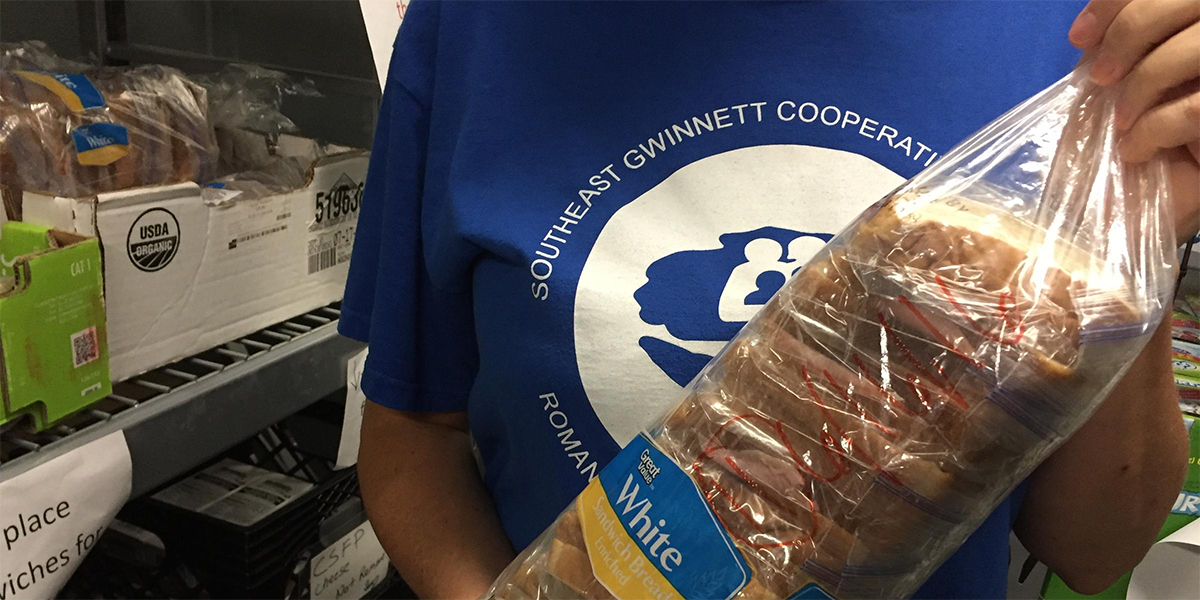Programs Try To Tackle Georgia’s Summertime Child Hunger Gap

Kate Sweeney / WABE
Every weekday morning in the summer, nine-year-old Jayden Towns lines up with about two dozen other neighborhood kids under a shady tree in his Snellville neighborhood. They come to collect bagged lunches from volunteers from Southeast Gwinnett Cooperative Ministry.
The summer meal program rolled out by the co-op is one of hundreds trying to fill a growing need around the state. Nearly 60 percent of Georgia’s public school children are eligible for free or reduced lunches, but once summer rolls around, fewer than 15 percent of them have access to those meals.
On this day, Jayden’s bag contained a sandwich, Cheetos, chocolate cookies, a drink and two servings of his favorite treat — fruit cups.
Jayden says he’s got a strategy. “I save the fruit snacks, and any other stuff that I don’t want now, and I’ll eat ‘em later.”
The ability to serve themselves and save some food for later is part of the design of these bagged meals, since a lot of children depend on schools for free breakfast and lunch, and need to make these meals stretch. Besides, as many of the parents waiting with their kids today said, kids in the summertime? They eat all day long.
Like a lot of the co-op’s volunteers, Angela Sackett is a schoolteacher — she teaches first grade in Duluth. Now she spends her summer mornings here in Snellville handing out lunches because of something she witnessed in her classroom.
“I had some students, in particular this year, that, if they would get to school even too late to have breakfast, I would see that they were hungry, and a kid can’t really learn very well if they’re hungry,” Sacket says.
This is her second summer volunteering. Sackett actually grew up middle-class a couple of miles from here, never knowing poverty was an issue in Gwinnett.
“And it’s more prevalent here than you think,” she says.
Her fellow volunteer, retired principal Diane Eberhart, had a similar experience.
She says the school where she worked, Brookwood Elementary School, was fairly affluent, “which is odd because it’s across [Highway] 78, across from the exact neighborhood where we deliver these lunches.“
“Which shows you the differences in communities and how sometimes [hunger] can just kind of hide,” Sackett adds.
There is a country club less than four miles from today’s busiest food stop. The median income in Gwinnett County hovers around $60,000, according to U.S. Census figures. But 20 percent of its children live below the poverty line.
Many Georgia counties have a much higher poverty rate. It’s a state problem that’s growing, according to Danah Craft. She directs the Georgia Foodbank Association, and says that one in four Georgia children lack reliable access to food.
“Even as the recession has gone in the rearview mirror, and it looks like the economy’s coming back, the jobs have not come back,” Craft says. “And the food bank network knows that more than half the people who are coming to them for food assistance has someone in the household working. We’ve got a lot of families who are not getting enough hours, or their wages aren’t high enough for them to be able to make ends meet.”
That’s a familiar story to one mother who asked that her name not be used, saying, “It does get embarrassing when you have to ask for help, you know?”
She was off to run errands with her five children in her van, and brought them here to grab their lunches.
She says her husband works 40 hours a week, “and then some,” doing odd jobs like cutting grass once he gets off work.
But it’s just not enough — and these days, she finds herself caring for her elderly parents too.
“It’s easy to look down on people, saying, you know, ‘Well, just get another job.’ It’s not that simple.”
Meanwhile, she’s thankful programs like this one exist to fill the gaps.
This summer, Southeast Gwinnett Cooperative Ministry expects to provide 15,000 summer lunches to children living in its five-mile radius. Around the state, similar federally-funded programs expect to provide nearly 10 million.
9(MDAxODM0MDY4MDEyMTY4NDA3MzI3YjkzMw004))








